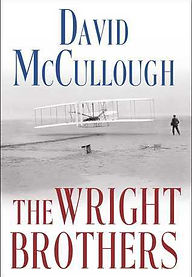top of page
Books That Inspire Curiosity
“A house without books is like a room without windows.”
-Horace Mann, Father of American Education

The Clockwork Universe
by Edward Dolnick
I love books that place me into the mindset of people for whom our commonsense ideas were radical. Here, it was the revolutionary concept that the universe is explainable and, in principle, the same way a mechanical clock could be explained. You’ll come across some familiar names in this book: Newton, Kepler, Euclid, Einstein, Galileo, but what’s unique in it is that it does a brilliant job with showing what their individual insights have to do with all the others’.
However, comparing the world to a clock is a bit dated. It probably made sense back then, but that just happened to be the most advanced piece of technology in those days. Nowadays, you’ll hear theories about how the universe is like a computer with simulations, information processing, etc. Go figure.

The Demon Haunted World
by Carl Sagan
A classic of scientific reasoning. The chapter The Dragon in my Garage is worth the
price alone, and you’ll never look at superstitious claims the same way again. Among
the plenty of things that struck me as interesting in this book, what really stood out was Sagan’s tone in his writing. He seemed to know that you don’t convince anyone of anything if you first call them an idiot.
Having our beliefs challenged can be very taxing, but I doubt anyone whose beliefs are his target would come away from it disliking Sagan himself—he’s just so cool-headed.

Cat’s Cradle
by Kurt Vonnegut
Vonnegut’s work is the perfect antidote to the sometimes overwhelming feeling that the world has gone mad. He takes heavy and unsettling real world events and puts a zany and comical spin on them. Basically, he fights crazy with crazy.
When I first encountered Vonnegut as a young teenager, it was a bit of a revelation to learn that a humorous standpoint could be considered respectable and not insensitive or juvenile. Plenty of his books are like this, this one is my favorite.

The Wright Brothers
by David McCoullough
For me, reading history is like a great version of a grown-up bedtime story. The people lived so long ago in such different worlds, they almost seem fabled. A fantastic American story of innovation, The Wright Brothers tells about how two bicycle mechanics without any formal training in aviation engineering (because obviously there wasn’t any to be had) changed the world. And to boot, they come off as extremely likeable and the kind of people you’d want to know and root for. I particularly liked the quotes from the naysayers that claimed human flight could never be achieved. I very well could have been one of those people.

Yes Man
by Danny Wallace
A memoir where Wallce takes up a most unusual challenge—he must say ‘yes’ to
anything and everything he was offered.
Having no idea what he’s gotten himself into is very much the point as he just allows the world to open up to him in wildly unpredictable ways.
You’ll smile every page.

Travels with Charley
by John Steinbeck
It might come off as a bit sappy to consider a book to be a good friend, but so be it. As Steinbeck takes a trip across America to take it in in all its embodiments, you feel like you’re riding along with someone you’ve known for a long time. I couldn’t help but imagine myself in conversation with him and his utmost compassion and
thoughtfulness. Written in 1962, still a gem.

The Brain: The Story of You
by David Eagleman
A neuroscience introductory book, what strikes me as fascinating about this subject is how bizarre it is. The ways we perceive the world, process memories, utilize time,
establish our identities, etc. aren’t anything like what common sense tells us.
If you ever need more proof that truth is stranger than fiction, look no further than the mechanics of who we are.

Status Anxiety
by Alain de Botton
If I could force the world to read one book, this would be it. It will make you feel so good about yourself and your life. Alain de Botton begins by pointing out something I can’t believe I’ve overlooked; As far as material wealth is concerned, we today live far more comfortably than the vast majority of the humans that have ever lived. We live pretty cushy lives in that regard. Yet are we any happier? No, and de Botton pinpoints the problem as constantly comparing ourselves to the lives of others and our erroneous ideas of what they must be like. I can tell you that you’re fine the way you are, but that would ring hollow without solid reasons. Alain de Botton gives you those reasons.
bottom of page